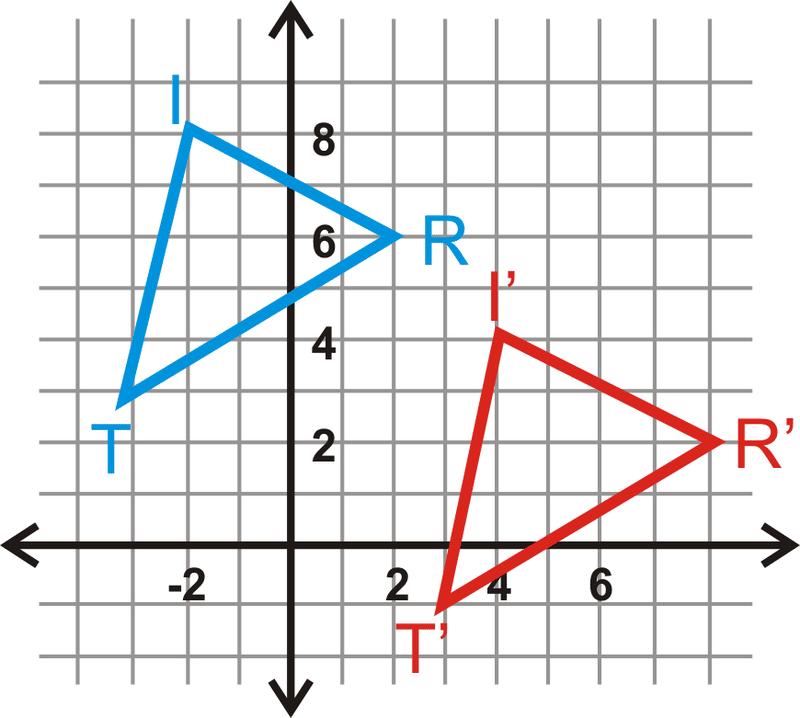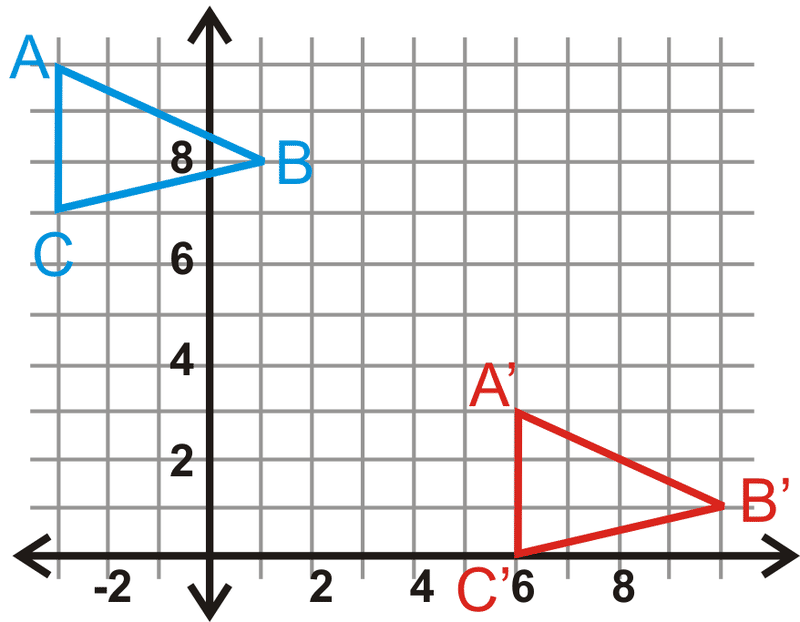12.3 几何翻译
章节大纲
-
Translations
::笔译翻译A transformation is an operation that moves, flips, or otherwise changes a figure to create a new figure. A rigid transformation (also known as an isometry or congruence transformation ) is a transformation that does not change the size or shape of a figure.
::变换是一种移动、翻转或以其他方式改变数字以创建新图的操作。 僵硬变换( 也称为等离线或相容变换) 是一种不会改变图的大小或形状的变换 。The rigid transformations are translations , reflections , and rotations . The new figure created by a transformation is called the image . The original figure is called the preimage . If the preimage is , then the image would be , said “a prime.” If there is an image of , that would be labeled , said “a double prime.”
::硬质变换是翻译、反射和旋转。 由变换创造的新数字被称为图像。 原始数字被称为预映。 如果预映为A,那么图像将是A , “ 黄金 ” 。 如果有A 的图像,则标为A 的A , “双质 ” , 则表示“双质 ” 。A translation is a transformation that moves every point in a figure the same distance in the same direction. For example, this transformation moves the to the right 5 units and up 3 units. It is written .
::翻译是一种转换, 将数字中的每个点都移动在同一方向的相同距离。 例如, 此转换会向右移到 5 个单位, 向上移到 3 个单位。 它会写入 (x, y) {( x+5,y+3) 。What if you were given the coordinates of a quadrilateral and you were asked to move that quadrilateral 3 units to the left and 2 units down? What would its new coordinates be?
::如果你们获得四边形的坐标,然后被要求将四边形的3个单元移到左边,然后将2个单元移到下面呢?它的新坐标是什么?Examples
::实例Example 1
::例1Triangle has coordinates and . Translate to the left 4 units and up 5 units. Determine the coordinates of .
::ABC三角有坐标A(3)-1、B(7)-5和C(2)-2。将ABC转换为左4个单元和上5个单元。确定A_B_C的坐标。Graph . To translate , subtract 4 from each value and add 5 to each value of its coordinates.
::ABC. 要翻译 ABC, 从每x值中减去 4, 并在坐标的每个 y 值上增加 5 。
::A(3,-1)-(3 - 4,-1+5)=A*(1,4)B(7,5)-(7,4,-5+5)=B[3,0)C(-2,2,-2)-(-2,4,-4,-2,+5)=C*(-6,3)The rule would be .
::规则是(x,y)(x-4,y+5)。Example 2
::例2Using the translation , what is the image of ?
::使用翻译 (x,y) (x+2,y- 5) , A(-6, 3) 的图像是什么 ?
::A*(-4,-2002)Example 3
::例3Graph square and . Find the image after the translation . Then, graph and label the image.
::图形S(1,2,Q(4,1,1,R(5,4)和E(2,5,5)和E(2,5),在翻译(x,y)(x--2,y+3)后查找图像。We are going to move the square to the left 2 and up 3.
::我们要把广场移到左边2和3
:x,y)(x-2,y+3)S(1,2,9+3)S[1,5]S[1,5]Q(4,1,1,2,4)R(5,4)R[3,7)E(2,5)E(0,8)
Example 4
::例4Find the translation rule for to .
::查找 TRI 到 TRI 的翻译规则 。Look at the movement from to . The translation rule is .
::翻译规则是 (x,y)(x+6,y-4)。Review
::回顾Use the translation for questions 1-7.
::问题1-7使用翻译(x,y)%(x+5,y-9)-
What is the image of
?
::A(-1)的图像是什么? -
What is the image of
?
::B(2,5)的图像是什么? -
What is the image of
?
::C(4)-2的图像是什么? -
What is the image of
?
::AA的图像是什么? -
What is the preimage of
?
::D(12,7)的预景是什么? -
What is the image of
?
::什么是A的形象? -
Plot
and
from the questions above. What do you notice?
::从上面的问题中绘制A、A、A、A和A,你注意到什么了?
The vertices of are and . Find the vertices of , given the translation rules below.
::ABC的顶点为A(-6),B(-3)-10和C(-5),2。 参照以下翻译规则,找出QAABC的顶点。-
:x,y)(x-2,y-7)
-
:x,y)(x+11,y+4)
-
:x,y)(x,y-3)
-
:x,y)(x-5,y+8)
-
:x,y)(x+1,y)
-
:x,y)(x+3,y+10)
In questions 14-17, is the image of . Write the translation rule.
::在问题14-17中,A_B_C_是ABC的图像。写翻译规则。Use the triangles from #17 to answer questions 18-20.
::使用 #17 的三角形回答问题 18 -20。-
Find the lengths of all the sides of
.
::找出ABC所有侧面的长度 。 -
Find the lengths of all the sides of
.
::找出AABC的两侧长度。 -
What can you say about
and
? Can you say this for
any
translation?
::你能对"ABC"和"ABC"说些什么吗? -
If
was the
preimage
and
was the image, write the translation rule for #14.
::如果"A"B"C"是预视图像,"ABC"是图像, 请写14号的翻译规则。 -
If
was the
preimage
and
was the image, write the translation rule for #15.
::如果"A"B"C"是预视图像,"ABC"是图像, 请写第15页的翻译规则。 -
Find the translation rule that would move
to
, for #16.
::找到将 A 移到 A {0,0 的翻译规则, 用于 # 16 。 -
The coordinates of
are
and
. Translate
to the right 5 units and up 11 units. Write the translation rule.
::DEF的坐标是D(4)-2,E(7)-4和F(5,5,3),将DEF转换到右边的5个单位和11个单位。写翻译规则。 -
The coordinates of quadrilateral
are
and
. Translate
to the left 3 units and down 7 units. Write the translation rule.
::四边QUAD的坐标是Q(-6)1,U(-3,7),A(4)-2和D(1,-8),将QUAD向左3个单位和向下7个单位翻译。写翻译规则。
Review (Answers)
::回顾(答复)Click to see the answer key or go to the Table of Contents and click on the Answer Key under the 'Other Versions' option.
::单击可查看答题键, 或转到目录中, 单击“ 其他版本” 选项下的答题键 。 -
What is the image of
?








